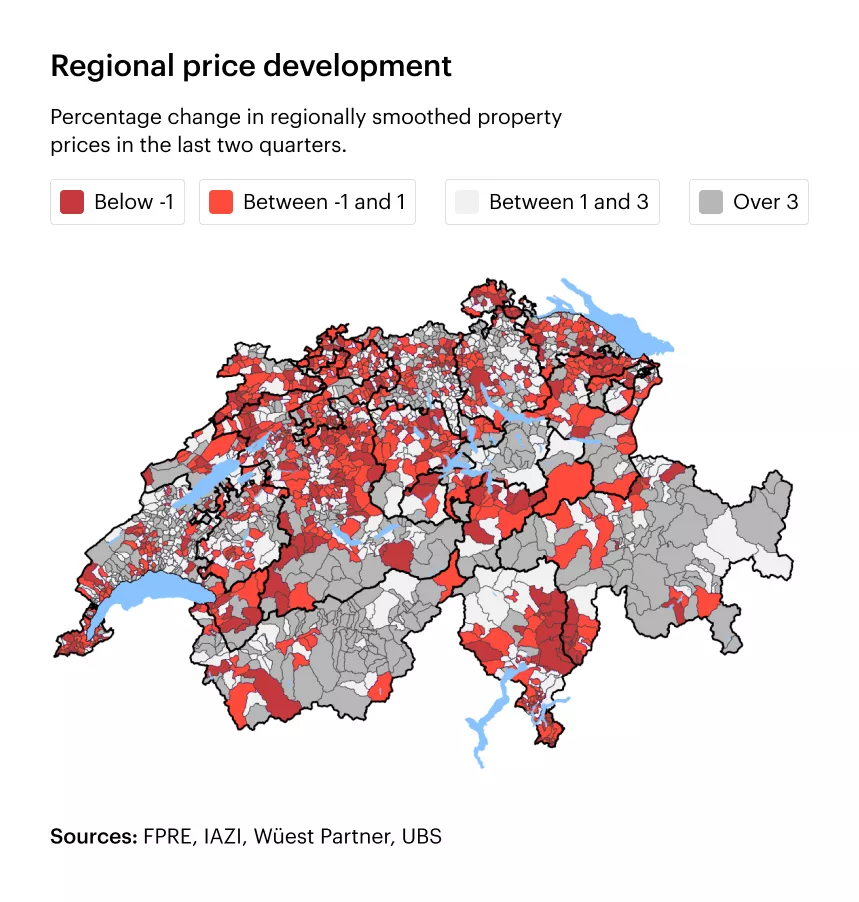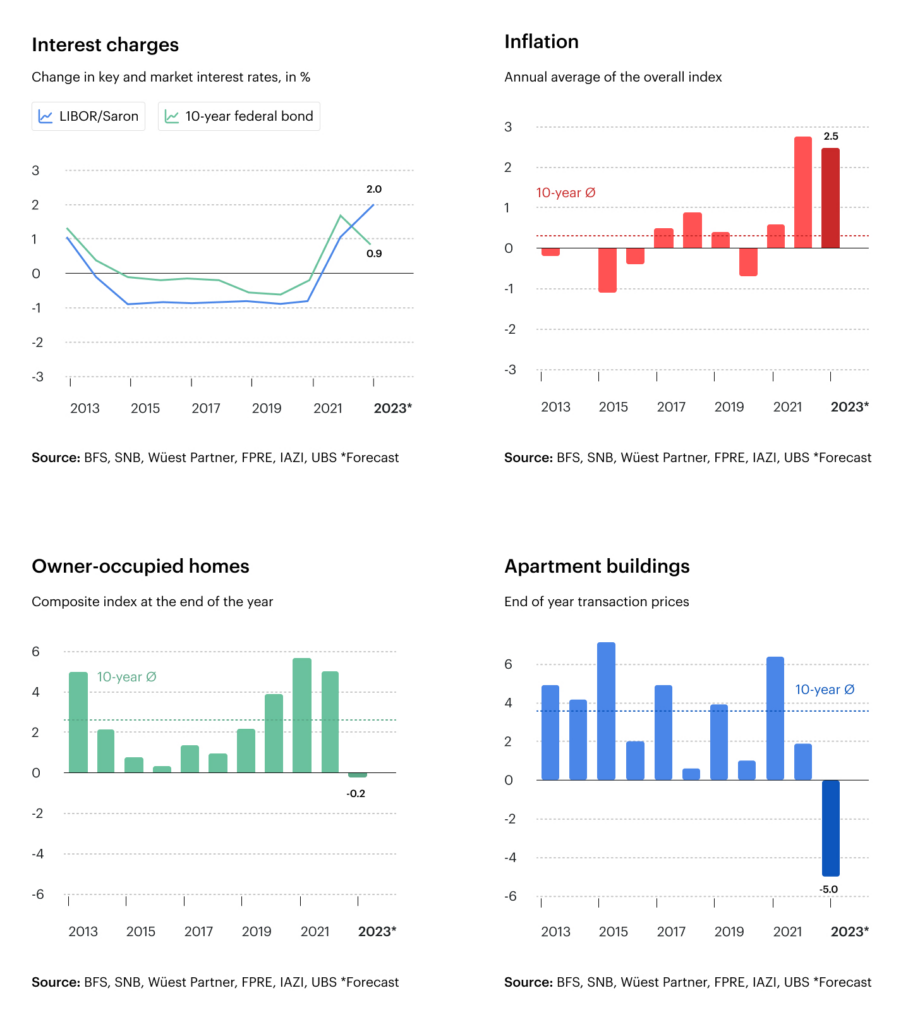The increase in the key interest rate by the Swiss National Bank (SNB) from 1.50 % to 1.75 % signals that further interest rate hikes are to be expected in the coming quarters. This has an impact on the real estate market. Homeowners are confronted with continuing rising costs, a changed investment environment and initial value adjustments. What specific consequences does this have for property owners?
Table of contents
ToggleOvervaluation of real estate, the macroeconomic perspective
According to analyses by UBS.com, condominiums are currently overvalued by between 15 % and 40 %, depending on the given interest rates. During the pandemic years 2021 and 2022, the home ownership sector experienced strong price increases of 1.5% per quarter on average, which corresponds to an annual increase in value of 6%. However, the last two quarters show a clear slowdown in price increases. According to UBS, the quarterly growth rate has halved and is now around a third of the pandemic level. Although prices remain robust, the slowdown in growth is a clear indication of a slowdown in the Swiss real estate market.

Regional differences and effects of the rise in interest rates
From a geographical perspective, property prices in centers such as Zurich, Geneva, Bern, Basel and Schaffhausen are showing a negative trend in price development. In contrast, the Alpine region is still showing solid price growth, although this has slowed somewhat. Mixed price trends can be observed in rural areas and suburbs. The interest rate hikes have reduced the financial attractiveness of real estate investments and this is a major factor in this slowdown.

The real estate market is currently being influenced by the following factors: Firstly, the increase in interest rates is placing a greater burden on households, both in terms of income and assets. Secondly, buying real estate has become significantly more expensive than renting. Thirdly, investments in real estate have become less attractive, which has significantly reduced demand for such investments.
The rising cost of home ownership
The financial burden on households has increased considerably over time, particularly in the context of property. The running costs for owner-occupied homes rose from 18% in 2019 to currently 30%. The general guideline is that housing costs should not exceed one third of income. The directive is becoming increasingly difficult or impossible to comply with.
Not only has household income come under greater strain, but assets have also been strained. In 2019, an average of 75 % of household assets had to be used for equity at the time of purchase. It is currently almost 100 %. This development has meant that young people in particular are dependent on financial support from wealthy relatives in order to buy their own home.
Let the experts guide you. We are at your side for questions and non-binding advice. Arrange a consultation directly or call us on +41 44 244 32 00.
Buying vs. renting: Changing investment environment
Buying property was once considered more financially attractive than renting, which encouraged many tenants to buy. According to UBS figures, owner-occupied homes were between 15 % and 20 % cheaper than comparable rental properties in 2019. Current figures show a new picture: buying is now around 40 % more expensive than renting. This trend is slowing the demand for home purchases, despite the housing shortage. In the past, the “buy-to-let” strategy – i.e. buying properties to let – attracted numerous investors. The lucrative returns in 2019 made this form of investment particularly attractive, especially in comparison to negative-yielding alternatives such as real estate funds or bonds.
The investment environment has changed significantly. The days of the “buy-to-let” real estate market appear to be a thing of the past for the time being. Previous incentives such as low interest rates are no longer guaranteed, while mortgage interest rates, operating and administrative costs have risen significantly. These factors influence the profitability of buy-to-let investments. Investors face the complex challenge of whether and how they can transfer increased costs to their tenants. From a legal point of view, this is a challenging task. The inflationary environment is placing an additional burden on the population’s purchasing power and thus increasing the complexity of the situation.

It is important to emphasize that buy-to-let can still be a potentially profitable form of investment. However, it depends heavily on the specific circumstances of the individual, real estate prices and rental yields. Careful consideration and analysis is crucial to understanding the potential and risks of a buy-to-let investment.
Oversupply and shortage in the owner-occupier and rental market
The Swiss real estate landscape is characterized by changing dynamics in the owner-occupied and rental sectors. In the owner-occupier market, a previous shortage, exacerbated by the pandemic, has given way to a trend towards oversupply, offering buyers negotiating room and choice. In contrast, demand in the rental sector has outstripped supply due to falling construction activity, leading to a growing housing shortage and rising rents. These trends are expected to intensify over the next one to two years as the SNB’s interest rates rise. In conclusion, it can be said that the combination of rising reference interest rates and an expected wave of renovations will lead to robust rent increases in the coming years. These developments could also have a significant impact on the real estate landscape in Switzerland.

Saron or fixed-rate mortgage?
In the current mortgage market, many homeowners are faced with a choice: should the focus be on Saron or is a renewed extension of the fixed-rate mortgage the right choice?
Fixed-rate mortgages currently seem expensive due to excessive hedging costs. As hedging costs fall in the coming months, fixed-rate mortgage prices are likely to decrease, according to experts. This means that the Saron is currently coming into focus as a more attractive option. A 10-year forecast based on expert expectations suggests that the Saron is more cost-efficient compared to long-term fixed-rate mortgages. However, it is repeatedly emphasized that this is “a purely technical assessment”. For homeowners who are wary of rising interest rates, it may make sense to take out a fixed-rate mortgage for greater security. This provides a sense of security and financial stability. Saron is therefore ideal for those who can withstand rising interest rates and have a solid financial base without excessive debt. Nevertheless, not everyone can be recommended the same strategy. Some should opt for fixed-rate mortgages, others may consider a balanced mix of both products. Ultimately, the decision depends on many individual factors. Informed decision-making and seeking expert advice are therefore essential.
Conclusion
To summarize, it can be strongly assumed that the SNB will raise interest rates to 2% in September, while ten-year interest rates should ease. According to UBS, this means for the real estate market that homes, which have seen significant price increases in the last two to three years, are likely to experience stagnation in 2023 as running costs rise. According to the experts, apartment buildings, on the other hand, are feeling greater pressure as investors expect higher returns and alternative investments have become more attractive. As a result, the value of these properties is falling, a development that is already underway. According to UBS, a correction of 5 % is expected for 2023, although there is potential for rent increases. Without this potential, transaction prices for apartment buildings would correct much more sharply.

Realignment of the strategy
Property owners currently need to review, reassess and realign their strategies accordingly. The importance of keeping an eye on the latest market developments in order to make well-founded decisions has become increasingly relevant. If a sale is being considered or there is uncertainty about the current market situation, it is advisable to seek advice from real estate experts. Such expertise can provide comprehensive assistance with all aspects of letting, management or marketing – in a transparent, flexible and risk-free manner.
Always up to date. Subscribe to our newsletter now and never miss out on property news and offers.
All data are without guarantee. The information on these Internet pages has been carefully researched. Nevertheless, no liability can be assumed for the accuracy of the information provided.












